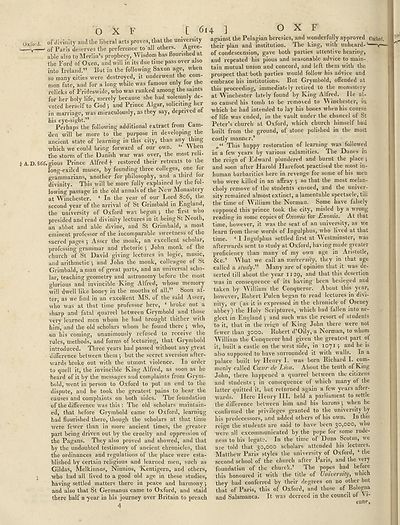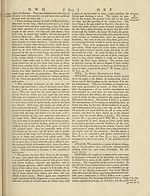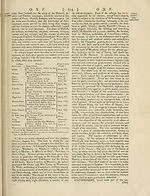Encyclopaedia Britannica > Volume 15, NIC-PAR
(690) Page 614 - OXF
Download files
Complete book:
Individual page:
Thumbnail gallery: Grid view | List view

O X F [ 6‘
Oxford. divinity and the liberal arts proves, that the university
w—-y—‘ of Paris deserves the preference to all others. Agree¬
able also to Merlin’s prophecy, Wisdom has flourished at
the Ford of Oxen, and will in its due time pass over also
into Ireland.” But in the following Saxon age, when
so many cities were destroyed, it underwent the com¬
mon fate, and for a long while was famous only lor the
relicks of Frideswide, who was ranked among the saints
for her holy life, merely because she had solemnly de¬
voted herself to God ; and Prince Algar, soliciting her
in marriage, was miraculously, as they say, deprived ot
his eye-sight.”
Perhaps the following additional extract from Cam¬
den will be more to the purpose in developing the
ancient state of learning in this city, than any thing
which we could bring forward of our own. “ When
the storm of the Danish war was over, the most reli-
4-A.D.86(J.gious Prince Alfred f restored their retreats to the
long-exiled muses, by founding three colleges, one for
grammarians, another for philosophy, and a third ior
divinity. This will be more fully explained by the fol¬
lowing passage in the old annals of the New Monastery
at Winchester. 4 In the year of our Ford 8c6, the
second year of the arrival ot St Grimbald in Pngland,
the university of Oxford was begun j the first who
presided and read divinity lectures in it being St Neoth,
an abbot and able divine, and St Grimbald, a most
eminent professor of the incomparable sweetness ot the
sacred pages *, Asser the monk, an excellent scholar,
professing grammar and rhetoric •, John monk of the
church of St David giving lectures in logic, music,
and arithmetic 5 and John the monk, colleague ot St
Grimbald, a man of great parts, and an universal scho¬
lar, teaching geometry and astronomy before the most
glorious and invincible King Alfred, whose memory
will dwell like honey in the mouths of all.” Soon al¬
ter, as we find in an excellent MS. of the said Asser,
who was at that time professor here, ‘ broke out a
sharp and fatal quarrel between Grymbold and those
verv learned men whom he had brought thither with
him, and the old scholars whom he found there j who,
on his coming, unanimously refused to receive the
rules, methods, and forms ot lecturing, that Grymbold
introduced. Three years had passed without any great
ditference between them ; but the secret aversion after¬
wards broke out with the utmost violence. In order
to quell it, the invincible King Alfred, as soon as he
heard of it by the messages and complaints from Grym¬
bold, went in person to Oxford to put an end to the
dispute, and he took the greatest pains to hear the
causes and complaints on both sides. The foundation
of the ditference was this : The old scholars maintain¬
ed, that before Grymbold came to Oxford, learning
had flourished there, though the scholars at that time
were fewer than in more ancient times, the greater
part being driven out by the cruelty and oppression of
the Pagans. They also proved and showed, and that
bv the undoubted testimony of ancient chronicles, that
the ordinances and regulations of the place were esta¬
blished by certain religious and learned men, such as
Gildas, Melkinnus, Ninnius, Kentigern, and others,
• who had all lived to a good old age in these studies,
having settled matters there in peace and harmony j
and also that St Germanus came to Oxford, and staid
there half a year in his journey over Britain to preach
4
4 ] O X F
against the Pelagian heresies, and wonderfully approved Oxtbrf.
their plan and institution. The king, with unheard-->r~
of condescension, gave both parties attenti ve hearing,
and repeated his pious and seasonable advice to main¬
tain mutual union and concord, and left them with the
prospect that both parties would follow his advice and
embrace his institutions. But Grymbold, offended at
this proceeding, immediately retired to the monastery
at Winchester lately found by King Alfred. He al¬
so caused his tomb to be removed to Winchester, in
which he had intended to lay his bones when his course
of life was ended, in the vault under the chancel of St
Peter’s church at Oxford, which church himself bad
built from the ground, of stone polished in the most
costly manner.’
This happy restoration of learning was followed
in a few years by various calamities. The Danes in
the reign of Edward plundered and burnt the place ;
and soon after Harold Harefoot practised the most in¬
human barbarities here in revenge for some ol his men
who were killed in an affray ; so that the most melan¬
choly remove of the students ensued, and the univer¬
sity remained almost extinct, a lamentable spectacle, till
the time of William the Norman. Some have falsely
supposed this prince took the city, misled by a wrong
reading in some copies ot Oxoviu ior Exoniu. At that
time, however, it was the seat of an university, as we
learn from these words of Ingulphus, who lived at that
time. ‘ 1 Ingulphus settled first at Westminster, was
afterwards sent to study at Oxford, hav ing made greater
proficiency than many of my own age in Aristotle,
Stc.’ What we call an university, they in that age
called a study.'1'1 Many are of opinion that it was de¬
serted till about the year 1x29, and that this desertion
was in consequence ot its having been besieged and
taken by William the Conqueror. About this year,
however, Robert Pulen began to read lectures in divi¬
nity, or (as it is expressed in the chronicle ot Oseney
abbey) the Holy Scriptures, which had fallen into ne¬
glect in England ; and such was the resort ot students
to it, that in the reign of King John there were not
fewer than 3000. Robert d’Oily, a Norman, to whom
William the Conqueror had given the greatest part ot
it, built a castle on the west side, in 1071 } and he is
also supposed to have surrounded it with walls. In a
palace built by Henry 1. was born Richard I. com¬
monly called Ccei/r de Lion. About the tenth of King
John, there happened a quarrel between the citizens
and students ; in consequence of which many ot the
latter quitted it, but returned again a few years after¬
wards. Here Henry III. held a parliament to settle
the difference between him and his barons j when he
confirmed the privileges granted to the university by
his predecessors, and added others of his own. In this
reign the students are said to have been 30,000, who
were all excommunicated by the pope lor some rude¬
ness to his legato. In the time ot Duns Scotus, we
are told that 30,000 scholars attended his lectures.
Matthew Paris styles the university of Oxford, ‘ the
second school of the church after Paris, and the very
foundation of the church.’ The popes had before
this honoured it with the title of University, which
they had conferred by their degrees on no other but
that of Paris, this of Oxford, and those of Bologna
and Salamanca. It was decreed in the council of Vi¬
enne,,
Oxford. divinity and the liberal arts proves, that the university
w—-y—‘ of Paris deserves the preference to all others. Agree¬
able also to Merlin’s prophecy, Wisdom has flourished at
the Ford of Oxen, and will in its due time pass over also
into Ireland.” But in the following Saxon age, when
so many cities were destroyed, it underwent the com¬
mon fate, and for a long while was famous only lor the
relicks of Frideswide, who was ranked among the saints
for her holy life, merely because she had solemnly de¬
voted herself to God ; and Prince Algar, soliciting her
in marriage, was miraculously, as they say, deprived ot
his eye-sight.”
Perhaps the following additional extract from Cam¬
den will be more to the purpose in developing the
ancient state of learning in this city, than any thing
which we could bring forward of our own. “ When
the storm of the Danish war was over, the most reli-
4-A.D.86(J.gious Prince Alfred f restored their retreats to the
long-exiled muses, by founding three colleges, one for
grammarians, another for philosophy, and a third ior
divinity. This will be more fully explained by the fol¬
lowing passage in the old annals of the New Monastery
at Winchester. 4 In the year of our Ford 8c6, the
second year of the arrival ot St Grimbald in Pngland,
the university of Oxford was begun j the first who
presided and read divinity lectures in it being St Neoth,
an abbot and able divine, and St Grimbald, a most
eminent professor of the incomparable sweetness ot the
sacred pages *, Asser the monk, an excellent scholar,
professing grammar and rhetoric •, John monk of the
church of St David giving lectures in logic, music,
and arithmetic 5 and John the monk, colleague ot St
Grimbald, a man of great parts, and an universal scho¬
lar, teaching geometry and astronomy before the most
glorious and invincible King Alfred, whose memory
will dwell like honey in the mouths of all.” Soon al¬
ter, as we find in an excellent MS. of the said Asser,
who was at that time professor here, ‘ broke out a
sharp and fatal quarrel between Grymbold and those
verv learned men whom he had brought thither with
him, and the old scholars whom he found there j who,
on his coming, unanimously refused to receive the
rules, methods, and forms ot lecturing, that Grymbold
introduced. Three years had passed without any great
ditference between them ; but the secret aversion after¬
wards broke out with the utmost violence. In order
to quell it, the invincible King Alfred, as soon as he
heard of it by the messages and complaints from Grym¬
bold, went in person to Oxford to put an end to the
dispute, and he took the greatest pains to hear the
causes and complaints on both sides. The foundation
of the ditference was this : The old scholars maintain¬
ed, that before Grymbold came to Oxford, learning
had flourished there, though the scholars at that time
were fewer than in more ancient times, the greater
part being driven out by the cruelty and oppression of
the Pagans. They also proved and showed, and that
bv the undoubted testimony of ancient chronicles, that
the ordinances and regulations of the place were esta¬
blished by certain religious and learned men, such as
Gildas, Melkinnus, Ninnius, Kentigern, and others,
• who had all lived to a good old age in these studies,
having settled matters there in peace and harmony j
and also that St Germanus came to Oxford, and staid
there half a year in his journey over Britain to preach
4
4 ] O X F
against the Pelagian heresies, and wonderfully approved Oxtbrf.
their plan and institution. The king, with unheard-->r~
of condescension, gave both parties attenti ve hearing,
and repeated his pious and seasonable advice to main¬
tain mutual union and concord, and left them with the
prospect that both parties would follow his advice and
embrace his institutions. But Grymbold, offended at
this proceeding, immediately retired to the monastery
at Winchester lately found by King Alfred. He al¬
so caused his tomb to be removed to Winchester, in
which he had intended to lay his bones when his course
of life was ended, in the vault under the chancel of St
Peter’s church at Oxford, which church himself bad
built from the ground, of stone polished in the most
costly manner.’
This happy restoration of learning was followed
in a few years by various calamities. The Danes in
the reign of Edward plundered and burnt the place ;
and soon after Harold Harefoot practised the most in¬
human barbarities here in revenge for some ol his men
who were killed in an affray ; so that the most melan¬
choly remove of the students ensued, and the univer¬
sity remained almost extinct, a lamentable spectacle, till
the time of William the Norman. Some have falsely
supposed this prince took the city, misled by a wrong
reading in some copies ot Oxoviu ior Exoniu. At that
time, however, it was the seat of an university, as we
learn from these words of Ingulphus, who lived at that
time. ‘ 1 Ingulphus settled first at Westminster, was
afterwards sent to study at Oxford, hav ing made greater
proficiency than many of my own age in Aristotle,
Stc.’ What we call an university, they in that age
called a study.'1'1 Many are of opinion that it was de¬
serted till about the year 1x29, and that this desertion
was in consequence ot its having been besieged and
taken by William the Conqueror. About this year,
however, Robert Pulen began to read lectures in divi¬
nity, or (as it is expressed in the chronicle ot Oseney
abbey) the Holy Scriptures, which had fallen into ne¬
glect in England ; and such was the resort ot students
to it, that in the reign of King John there were not
fewer than 3000. Robert d’Oily, a Norman, to whom
William the Conqueror had given the greatest part ot
it, built a castle on the west side, in 1071 } and he is
also supposed to have surrounded it with walls. In a
palace built by Henry 1. was born Richard I. com¬
monly called Ccei/r de Lion. About the tenth of King
John, there happened a quarrel between the citizens
and students ; in consequence of which many ot the
latter quitted it, but returned again a few years after¬
wards. Here Henry III. held a parliament to settle
the difference between him and his barons j when he
confirmed the privileges granted to the university by
his predecessors, and added others of his own. In this
reign the students are said to have been 30,000, who
were all excommunicated by the pope lor some rude¬
ness to his legato. In the time ot Duns Scotus, we
are told that 30,000 scholars attended his lectures.
Matthew Paris styles the university of Oxford, ‘ the
second school of the church after Paris, and the very
foundation of the church.’ The popes had before
this honoured it with the title of University, which
they had conferred by their degrees on no other but
that of Paris, this of Oxford, and those of Bologna
and Salamanca. It was decreed in the council of Vi¬
enne,,
Set display mode to:
![]() Universal Viewer |
Universal Viewer | ![]() Mirador |
Large image | Transcription
Mirador |
Large image | Transcription
Images and transcriptions on this page, including medium image downloads, may be used under the Creative Commons Attribution 4.0 International Licence unless otherwise stated. ![]()
| Encyclopaedia Britannica > Encyclopaedia Britannica > Volume 15, NIC-PAR > (690) Page 614 - OXF |
|---|
| Permanent URL | https://digital.nls.uk/192590668 |
|---|
| Attribution and copyright: |
|
|---|
| Shelfmark | EB.11 |
|---|---|
| Description | Ten editions of 'Encyclopaedia Britannica', issued from 1768-1903, in 231 volumes. Originally issued in 100 weekly parts (3 volumes) between 1768 and 1771 by publishers: Colin Macfarquhar and Andrew Bell (Edinburgh); editor: William Smellie: engraver: Andrew Bell. Expanded editions in the 19th century featured more volumes and contributions from leading experts in their fields. Managed and published in Edinburgh up to the 9th edition (25 volumes, from 1875-1889); the 10th edition (1902-1903) re-issued the 9th edition, with 11 supplementary volumes. |
|---|---|
| Additional NLS resources: |
|

